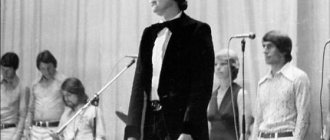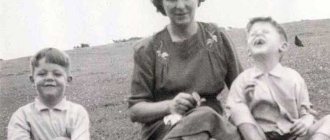Childhood and youth
Muslim Magomayev was born on August 17, 1942 in Baku. Father Magomet Magomayev died at the front, 15 days short of the great Victory. Before the war, Magomet Muslimovich worked as a theater artist. Muslim Magomayev’s mother Aishet is a dramatic actress who took the pseudonym Kinzhalova. Turkish, Adyghe and Russian blood flowed in her veins. Muslim considered himself an Azerbaijani and Russia as his mother. The grandfather of the future artist is the Azerbaijani composer Abdul-Muslim Magomayev, the founder of national classical music.
After the war, Muslim Magomayev and his mother went to Vyshny Volochek, where the actress Kinzhalova was thrown by creative fate. The boy studied at a music school for a year and became friends with his classmates, infecting the children with the idea of creating a puppet theater. Muslim made the puppets for performances himself. But Aishet sent her son to Baku, where, in her opinion, the musically gifted boy would receive the best education.
Published by Muslim Magomaev. Muslim Magomaev Sunday, August 13, 2020
Muslim Magomayev in his youth
In Baku, Muslim Magomayev grew up in the family of his uncle Jamal Muslimovich. Mother from Vyshny Volochok moved to Murmansk, where she worked at the local drama theater. Aishet married a second time and Muslim had a brother, Yuri, and a sister, Tatyana.
In his hometown, the guy plunged headlong into music. Muslim Magomayev spent hours listening to the “trophy” records of Enrico Caruso, Mattia Battistini and Titta Ruffo.
Next door to his uncle lived the family of the famous Azerbaijani singer Bulbul, and Muslim listened to the star singing in the mornings. Magomayev became friends with Bulbul’s son, Polad.
The boy’s successes at the music school at the Baku Conservatory, where his uncle took him, turned out to be half-hearted: in piano, solfeggio and choir lessons, Muslim was given the highest scores, but in physics, chemistry and mathematics, according to Magomayev, his brain “switched off.”
Cellist and professor Vladimir Anshelevich noticed a capable student and took him under his wing. The mentor showed the young vocalist how to sharpen his voice. Soon, the experience gained helped Muslim Magomayev in his work on the role of Figaro in the opera The Barber of Seville.
At the Baku Music College, the singer improved his vocals. His mentors were Alexander Milovanov and accompanist Tamara Kretingen, who devoted free time to the student. Magomayev was awarded the diploma in 1959.
Parents
Magomaev Muslim Magometovich, whose biography interests many, was born in 1942, on August 17, in the city of Baku. His father, Magomet Magomayev, worked as a theater artist and died at the front fifteen days before the Victory. The future singer’s mother, Aishet Magomayeva, was a dramatic actress and Stalinist scholarship recipient. She performed on stage under the creative pseudonym Kinzhalova. The boy’s grandfather, Abdul-Muslim Magomayev, is a famous composer in Azerbaijan. The Azerbaijan State Philharmonic Society bears the name of this talented person. Thus, the biography of Muslim Magomayev has been connected with creativity since birth.
Personal life
Young students of the Baku Music College sighed for the handsome, vociferous Muslim Magomayev, but he gave preference to the young and charming Ophelia. The hasty marriage turned out to be a mistake: the couple separated after a year of marriage. Even the little daughter Marina could not save the young family.
In 1972, Muslim's romance with singer Tamara Sinyavskaya began. They met and fell in love in Baku, during the decade of Russian art. Tamara was a married woman, but the bonds of marriage turned out to be a weak obstacle for the flaring up of feelings. The love of Magomaev and Sinyavskaya withstood the test of separation: after Tamara’s year-long internship in Italy, the couple met and never parted.
In November 1974, Muslim Magomayev married the singer: the couple planned a modest celebration, but family and friends gave them a banquet in a restaurant in the capital.
Muslim Magomayev and Tamara Sinyavskaya
Published by Köhnə Azərbaycan / Old Azerbaijan Wednesday, March 16, 2020
Muslim Magomaev and wife Tamara Sinyavskaya
The couple’s personal life turned out to be like a “roller coaster”: Magomayev and Sinyavskaya are two bright stars with strong characters, it was not easy for the spouses to give in to each other. But love cemented the marriage forever and after stormy quarrels and short breakups, the lovers wrote a new page in their relationship.
The last years of the singer’s life were spent next to the woman he loved. Muslim Magomayev and Tamara Sinyavskaya often vacationed in Baku and barbecued on the shores of the Caspian Sea. In the spring and summer, the couple lived at a dacha near Moscow, where they grew a picturesque garden and built an alpine hill. Muslim Magometovich painted, composed arrangements and music.
Daughter Marina inherited her father’s musical gift: the girl graduated from a music school with a degree in piano, but chose another profession not related to music and vocals. Marina maintained a warm relationship with her father until the last days of her life. She lives in America with her husband Alexander Kozlovsky (the son of Gennady Kozlovsky, who wrote the poems for Magomaev’s song “Blue Eternity”). Marina gave her grandson Allen to her father during his lifetime.
Family and Children
From his youth, the singer often attracted the attention of young girls, because his expressive appearance could not go unnoticed by the opposite sex. However, the young man quickly made his choice and proposed to Ophelia. The marriage produced a daughter, Marina, but even this could not keep the passionate singer close to his wife. Unfortunately, the first marriage was not very successful, and after a year the couple separated.
And in 1972, the opera singer met performer Tamara Sinyavskaya. Two of the country's strongest singers find true feelings, but cannot be together, since the girl had a husband at that time. The lovers do not see each other for a whole year, but they can no longer break the bonds of love, therefore, having met after separation, they do not let each other go for the rest of their lives.
The young people were not planning a big and loud wedding, they just wanted to officially consolidate their relationship, but the families decided to surprise them and booked an evening for the newlyweds in an expensive Moscow restaurant. Magomaev and Sinyavskaya never parted again and spent their entire lives side by side, but their relationship cannot be called simple. Due to the bright and expressive characters of each, there were many ups and downs in family life, but after each loud quarrel, the spouses always made peace and even started all over again.
Music
The artist’s creative biography began in his hometown at the House of Culture of Baku Sailors. Magomayev’s family was afraid for his voice and forbade Muslim to perform in full force, but the 15-year-old boy went on stage secretly from his family, receiving the first applause. He managed to avoid teenage voice mutation.
In 1961, Muslim Magomayev made his professional debut in the Song and Dance Ensemble of the Baku Military District. A year later, he performed the song “Buchenwald Alarm” and his talent was noted at the World Youth Festival in Helsinki. In the same year, in the Kremlin Palace of Congresses, the vocalist won all-Union fame by performing at the festival of Azerbaijani art.
Edita Piekha and Muslim Magomaev
Published Interesting about geniuses and famous personalities Sunday, May 14, 2020
Muslim Magomayev and Edita Piekha
In 1963, in the concert hall named after P.I. Tchaikovsky hosted the singer's first solo concert. In Baku, Magomayev becomes a soloist at the Azerbaijan Opera and Ballet Theater named after Akhundov. In 1964, the vocalist went on an internship at Milan's La Scala theater for 2 years.
In the mid-60s, Muslim Magomayev toured the cities of the Soviet Union with the musical performances “The Barber of Seville” and “Tosca”. The talented vocalist is invited to perform on the stage of the Bolshoi Theater, but Magomaev does not want to limit himself to opera.
In the mid-60s, the singer toured in Paris. Admired by Magomayev’s talent, the director of the famous Olympia, Bruno Cockatrice, offered the singer a contract for a year. They predicted world fame for him, and Muslim Magomayev thought about the proposal. But everything was decided by the USSR Ministry of Culture: the Azerbaijani vocalist is indispensable at government concerts.
In Paris, the artist learned that a criminal case had been opened against him in his homeland. To help the Don Cossack Song and Dance Ensemble, in the late 1960s the singer performed in Rostov-on-Don at a 45,000-seat stadium. Instead of one planned part, Magomayev spent more than two hours on stage. They paid him triple his salary, assuring him that there was no violation of the law and that the rate was approved by the Ministry of Culture. The singer was informed about the criminal prosecution through the OBKhSS during a concert at Olympia. Not wanting to put his family at risk, Muslim Magomayev did not succumb to the persuasion of the emigrants and returned to the USSR.
As a result of legal proceedings, Muslim Magomayev was banned from performing outside Azerbaijan. The singer took advantage of the free time he had and graduated from the Baku Conservatory in singing. The disgrace ended after a call from the Chairman of the KGB of the USSR Yuri Andropov to the Minister of Culture Ekaterina Furtseva: Magomayev was invited to the department’s anniversary concert.
Muslim Magomaev, Svetlana Morgunova, Bedros Kirkorov.
Published by Muslim Magomayev/Muslim Magomayev Saturday, April 30, 2016
Muslim Magomayev, Svetlana Morgunova, Bedros Kirkorov
In Sopot in 1969, Muslim Magomayev won first prize at the International Festival; in Cannes, the International Festival of Recordings and Music Publishing awarded him the “Golden Disc” for millions of records sold. At the age of 31, the singer becomes not only the People's Artist of the Azerbaijan SSR, but also the People's Artist of the USSR.
Since 1975, Muslim Magomayev has led the established pop-symphony orchestra for 14 years. He toured with musicians until 1989 throughout the USSR and foreign countries. Magomayev managed to popularize modern Western trends, which in those years was not approved by the highest party leadership of the USSR. The singer performed the Beatles hit “Yesterday” for the first time in the Soviet Union.
Songs performed by Muslim Magometovich to the verses of Arno Babajanyan occupy a special place in the star’s work. The compositions “Wedding”, “The Best City on Earth”, “Ferris Wheel”, “Illuminated by the Sun”, “Nocturne” are so bright and expressive that the listeners remembered them “right away”.
Magomayev's hit "Beauty Queen" Babajanyan was inspired by a Yerevan beauty contest held in the 60s. The song was the leader in the “Best Song of 1965” competition.
The verses for the poignant song “Blue Eternity” were written for the singer by a friend, Baku resident Gennady Kozlovsky, who moved to Moscow in 1971, and since 1979, at the suggestion of Magomayev, worked as director of the Azerbaijan Variety Symphony Orchestra.
The fate of some songs performed by Magomayev turned out to be difficult. The hit song “The Best City on Earth” with lyrics by Leonid Derbenev and music by Arno Babajanyan was broadcast on the radio for a month, but Nikita Khrushchev saw in the song “the pernicious spirit of the West” and with the words “Twist about Moscow? Ban! gave instructions to take the hit off the air. The song was “rehabilitated” shortly after Khrushchev’s removal from the post of First Secretary of the Central Committee. In 2013, at the celebration of the 866th anniversary of the capital, Magomayev’s hit became the leitmotif of the celebration.
The song “We can’t live without each other” to the words of Alexandra Pakhmutova, performed by Muslim Magomayev, is still a hit these days. The same can be said about the hits of the 70s “Snow is Falling” and “Ray of Golden Sun”. The last composition is heard in the sequel to the animated film “The Musicians of Bremen”, where it is presented as a Troubadour serenade.
The peak of Muslim Magomayev's musical career was in the 60s and 70s. The singer gathered stadiums in the cities of the USSR, and was received with admiration by the concert and opera stages of the world.
Muslim Magomayev and Joseph Kobzon
In 1998, Muslim Magomayev stopped performing on stage. He stated that each talent has its own time, which cannot be overstepped. The artist devoted the last decade to painting, lived in Moscow, and communicated with fans through the website.
For decades, the artist was friends with the President of Azerbaijan Heydar Aliyev. After the death of a friend in 2003, Muslim Magomayev became isolated. A sick heart and lungs worried the star more and more often. But according to his wife Tamara Sinyavskaya, Muslim Magometovich smoked three packs of cigarettes a day. The singer quarreled with Polad Bulbul-oglu, who took the post of Minister of Culture of Azerbaijan, and criticized his policy in the cultural sphere of the country.
In 2005, Magomayev accepted Russian citizenship, but considered himself an Azerbaijani and was part of the leadership of an all-Russian public organization that united the Azerbaijani diaspora of the Russian Federation.
In 2007, Magomayev wrote his last song, “Farewell, Baku!” based on poems by Sergei Yesenin.
Creation
Since the 60s, the name Muslim Magomayev has increasingly appeared on the lips of listeners in the Soviet space. Participation in festivals, solo performances at the opera and ballet theater, and then a pop career. The singer toured throughout Europe from France to Italy. In addition to personal and operatic compositions, the performer developed Western music in the vastness of the USSR.
Albums, songs
There are a lot of famous compositions performed by Muslim Magomayev. Listeners highlight the following songs: “Melody”, “Thank you”, “Blue Eternity”, “Melody”. Opera hits: “The Marriage of Figaro”, “Eugene Onegin”, “Pagliacci”, “The Magic Flute”, “Faust”, “Tosca”.
Death
At the age of 60, Magomayev left the stage: his illness worsened. The soloist could not lead his old lifestyle, perform on stage or tour.
On October 25, 2008, Muslim Magometovich Magomayev passed away; he died in the arms of his wife Tamara Sinyavskaya. The cause of death of the great singer was coronary heart disease and atherosclerosis.
Published by Fuad Muradxanli Wednesday, August 21, 2019
Milos Bikovich as Muslim Magomayev
The farewell ceremony for the great artist took place at the Tchaikovsky Concert Hall in the capital. According to the will, Magomayev’s ashes were taken to his native Baku and buried in the Alley of Honor, where the famous grandfather Abdul-Muslim Magomayev rests.
Memory
In 2020, the series “Magomayev” was shown, dedicated to the fate and work of the great artist. The main role went to Milos Bikovich. The singer's wife, Tamara Sinyavskaya, was played by Irina Antonenko. Also in the biographical film are actors Svetlana Ustinova, Alexander Nesterov, Alena Ivchenko.
Discography
- 1995 – “Thank you”
- 1996 – “Arias from operas, musicals (Neapolitan songs)”
- 2001 – “Love is my song (Dreamland)”
- 2002 – “Arias from Operas”
- 2002 – “Songs of Italy”
- 2002 – “Concert in the Tchaikovsky Hall, 1963”
- 2003 – “With love for a woman”
- 2003 – “Rhapsody of Love”
- 2004 – “Muslim Magomaev. Improvisations"
- 2005 – “Muslim Magomaev. Concerts, concerts, concerts"
- 2006 – “Muslim Magomaev. Arias of P. I. Tchaikovsky and S. Rachmaninov"











